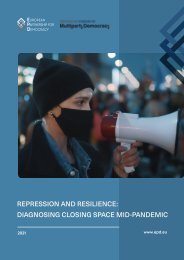Thinking Democratically: A Comprehensive Approach to Countering and Preventing Shrinking Space
Create successful ePaper yourself
Turn your PDF publications into a flip-book with our unique Google optimized e-Paper software.
an evolving trend in Indonesia <strong>and</strong> Kenya, with a somewhat limited impact on the closing of<br />
democratic space for the moment.<br />
Within such a context of low commitment <strong>to</strong> democratic values <strong>and</strong> practices, political parties have<br />
incentives <strong>to</strong> mobilise their elec<strong>to</strong>rate with polarising narratives rather than policy proposals. The<br />
instrumentalisation of ethnicity in elections in Kenya is not so dissimilar in this regard from the<br />
exclusionary rhe<strong>to</strong>ric of anti-pluralist, nativist parties in Europe. Parties such as the Rassemblement<br />
Nationale (former Front Nationale) in France or the Peace <strong>and</strong> Justice Party in Pol<strong>and</strong> thrive on the<br />
promise of safeguarding a very restricted notion of the nation from the identity threat posed by<br />
refugees, migrants, Muslims <strong>and</strong> other external influences. Xenophobic parties using a polarising<br />
rhe<strong>to</strong>ric have rapidly gained ground in Europe over the last decade. As stated in a study by the<br />
European Political Strategy Centre, “once in government, populists regularly use their democratic<br />
m<strong>and</strong>ate <strong>to</strong> undermine the very institutions that got them in<strong>to</strong> office in the first place, for instance<br />
by compromising judicial independence or media freedom.” 63<br />
As shown in the Georgia case study, such polarisation – similar <strong>to</strong> that of Western Europe – limits<br />
representation. “Ruling parties <strong>and</strong> (the) biggest opposition parties may be interested in prolonging<br />
a deeply polarised status-quo as (a) means <strong>to</strong> fend off the challenge from smaller players… The end<br />
result of this is a smaller number of capable parties driven by promoting a genuinely democratic<br />
agenda”. This is further exacerbated by newly emerging political movements that feed on the<br />
xenophobia <strong>and</strong> nationalism sown by domestic <strong>and</strong> Russian groups – including dem<strong>and</strong>ing for shrinking<br />
democratic space through exclusionary citizenship laws <strong>and</strong> NGO laws. Political parties likewise drive<br />
polarisation in Zimbabwe <strong>and</strong> thereby restrict space for contestation.<br />
Reforming representation<br />
While large parties’ actions <strong>to</strong> change the rules of the game in their favour are harmful for democratic<br />
representation, the case studies show that the existence of a very high number of parties also rids<br />
the institution of the political party from its representative function. Guatemala is plagued by a<br />
multitude of sham political parties coopted by corrupt <strong>and</strong> criminal groups. Since 1985, not a single<br />
party that has been in power has retained its legitimacy afterwards, with many disappearing<br />
completely. Both among citizens <strong>and</strong> among political parties, the frustrations with the inability of<br />
parties <strong>to</strong> affect real change pushes people <strong>to</strong> seek other forms of participation. In Guatemala, the<br />
lack of possibilities for registration for democratic parties in the 1960’s led <strong>to</strong> the creation of Civic<br />
Committees <strong>to</strong> nominate mayoral c<strong>and</strong>idates, which were incorporated in the elec<strong>to</strong>ral law of 1985<br />
allowing them <strong>to</strong> participate in municipal elections. In contrast <strong>to</strong> this positive example st<strong>and</strong>s the<br />
case of Georgia where nearly all opposition parties have engaged in extraconstitutional activities <strong>to</strong><br />
advance their interests, as formal channels of participation do not function in a fair manner. It has<br />
also given rise <strong>to</strong> other unconventional forms of citizen participation (see below).<br />
63<br />
European Political Strategy Centre (2019): 10 trends shaping democracy in a volatile world. Available here.<br />
33

















